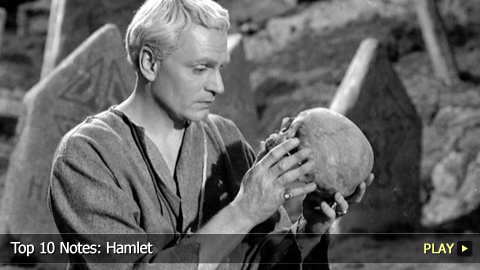Top 10 Notes: Hamlet

#10 – About the Author
Born in Stratford-upon-Avon, England and baptized in the mid-16th century, William Shakespeare went to grammar school as a boy and married Anne Hathaway at age 18. It was in the late 1500s that Shakespeare began acting in his own stage plays and those of others. The Bard of Avon also wrote sonnets and poems. His success allowed him to have a playing company and they constructed their own playhouse known as the Globe Theatre.
#9 – Influences and Inspirations
It’s believed that “Hamlet” was based on a legendary person named Amleth, as described by Danish author Saxo Grammaticus in a 12th century history document. Another theory speculates the lost play “Ur-Hamlet” may have served as inspiration. Either way, Shakespeare wrote “Hamlet” in the era’s generally accepted style, which was similar to his earlier plays. He also used long dramatic speeches, complex language and blank verse poetry to move the plot along.
#8 – Settings and Era
Taking place during the late medieval period in the Kingdom of Denmark, “Hamlet” is the longest play Shakespeare ever wrote. The tragedy revolves around the royal family of Denmark, including Prince Hamlet, King Claudius and Queen Gertrude, as well as their noblemen and women, such as Polonius and his daughter Ophelia.
#7 – Plot
The plot follows Hamlet as he discovers that his uncle Claudius killed his father to become King, and traces the Prince’s subsequent descent into madness caused by his desire for vengeance. After being approached by his dead father’s ghost, the Prince sets out to seek his revenge. He accidentally causes the death of the King’s chief counselor, which leads to his daughter Ophelia’s suicide. Hamlet’s final confrontation with Claudius leads to his uncle’s death, but also to the deaths of his mother, Ophelia’s brother and himself.
#6 – Prince Hamlet
With the full title being “The Tragedy of Hamlet, Prince of Denmark,” it’s not so surprising that the title character’s fate isn’t a happy one. The play’s core involves his mental struggles and actions following his father’s death and his anger towards his Uncle Claudius. These eventually lead to his downfall and the deaths of many loved ones later on.
#5 – Other Characters
King Claudius is Prince Hamlet’s uncle, brother to the deceased King Hamlet and now husband to his widow, Queen Gertrude. Though initially seen as a competent ruler, his true nature is revealed once Hamlet learns Claudius killed his father. While remorseful for his crimes, Claudius isn’t willing to give up his life or his throne: but in the end, his plans to murder his nephew go horribly wrong. Though her marriage to Claudius angers Hamlet, Gertrude does care for her son but feels little guilt. She is contrasted with the innocent and emotional Ophelia, who is also the object of Hamlet’s affections.
#4 – Values and Themes
Much of “Hamlet”’s power stems from the play’s themes: we’re shown a world where betrayal, revenge and immorality reign. Clearly this is no ideal world, for we see that these traits eventually lead to maddening and tragic results. Suicide and fear of death are also important themes, which Hamlet touches on in the play’s most famous speech.
#3 – Modern Popularity
Though Shakespeare’s plays were well received during his time, his greatness only really began to be fully appreciated in the 1800s. “Hamlet” is now considered one of his most influential plays and one of the greatest works in all of English literature. As such, it’s also one of his most performed, quoted and studied plays.
#2 – Literature Adaptations
Thanks to its many complexities and layers, “Hamlet” has inspired many writers, such as Henry Fielding, Goethe, Charles Dickens and James Joyce, with Herman Melville and George Eliot also notably developing Hamlet-like characters. Whether they’re direct or indirect references, it’s clear the tragedy has been very significant and will continue to be.
#1 – Screen Adaptations
While it’s been adapted for the stage, “Hamlet”’s popularity has made it one of history’s most filmed stories, including several notable movies. Laurence Olivier’s Oscar-winning 1948 take was one of the most successful film adaptations, but the '90s saw Mel Gibson and Kenneth Branagh portray the Prince of Denmark. "Hamlet" was then given a modern twist in the 21st century with Ethan Hawke.
Do you agree with our list? What’s your favorite piece of “Hamlet” trivia? Be sure to subscribe to WatchMojo.com for more entertaining top 10s.